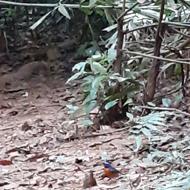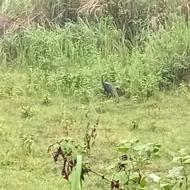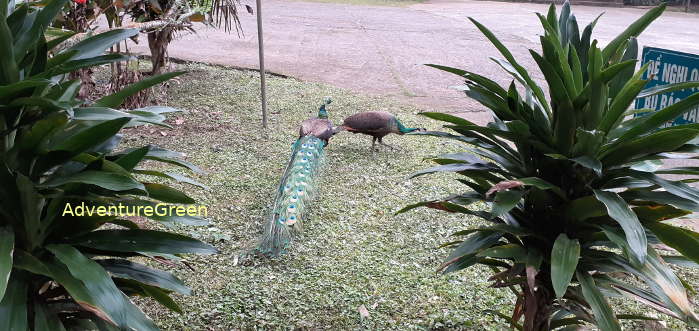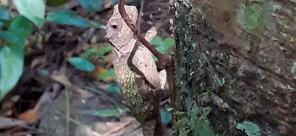Birds of Vietnam, Bird Species in Vietnam

Let's join AdventureGreen on our bird quests to learn about the different birds and bird species in Vietnam. Here you can find out more about the birding spots that these bird species are found.
- Order: Passeriformes
- Family: Turdidae
- Genus: Turdus
Black-breasted thrush
Turdus dissimilis
Hoét ngực đen
dissimilis: Latin: unlike, dissimilar, different (as the opp. of similis and consimilis
The black-breasted thrush (Turdus dissimilis) is a species of bird in the family Turdidae.
Male: The section from their head to the back of their neck and breast area is black, and the remaining areas at the top are slate gray.
Female: Gray-brown from the eyes to the tail, and the section from their throat to their breast is a "diffused" or streaked shade of buff.

- Order: Passeriformes
- Family: Muscicapidae
- Genus: Niltava
Fujian niltava
(Đớp ruồi cằm đen, Niltava davidi)
The Fujian niltava (Niltava davidi) is a species of bird in the family Muscicapidae.

- Order: Galliformes
- Family: Phasianidae
- Genus: Pavo
The green peafowl or Indonesian peafowl (Pavo muticus) is a peafowl species native to the tropical forests of Southeast Asia and Indochina.
Pavo: From Latin pāvō, likely borrowed from Ancient Greek ταώς (taṓs, “peacock”, peafowl), or possibly imitative (compare paupulō (“to call like a peacock”)).
Muticus: possibly Proto-Indo-European *mut- (“cut short”). Compare muticus (“docked”), Scottish Gaelic mutach (“short”), Ancient Greek μίτυλος (mítulos, “hornless”), μιστύλλω (mistúllō, “something cut up”). Possibly due to the Japanese painting depicting the bird without spurs that Carl Linnaeus based on to classify the fowl as Pavo muticus.






- Order: Passeriformes
- Family: Muscicapidae
The European robin (Erithacus rubecula), robin or robin redbreast in Great Britain and Ireland, is a small insectivorous passerine bird that belongs to the chat subfamily of the Old World flycatcher family.
- Order: Passeriformes
- Family: Muscicapidae
The name is normally applied to the more robust ground-feeding flycatchers found in Europe and Asia.
These species were formerly classified as members of the thrush family (Turdidae), but now placed in the Old World flycatcher family (Muscicapidae).
Chats make up most of the sub-family Saxicolinae, or commonly known as bush chat.
The European robin or simply robin belongs to the Chat sub-family.
- Order: Passeriformes
- Family: Motacillidae
Dendronanthus, or forest wagtail, is a wagtail genus in the family Motacillidae.
It has some distinct features:
- a distinctive plumage that sets it apart from other wagtails,
- has the habit of wagging its tail sideways unlike the usual up and down movements of the other wagtail species,
- is the only wagtail species that nests in trees.
Dendronanthus: "Dendron" (δένδρον) is the Greek word for "tree"; Anthus introduced for the pipits.
1/ Forest Wagtail (Chìa vôi rừng, Dendronanthus indicus)
- Order: Passeriformes
The flowerpeckers, once included in an enlarged sunbird family Nectariniidae, are a family, Dicaeidae, of passerine birds.
Dicaeidae, Dicaeum: Greek dikaion supposedly an Indian bird mentioned by Aelianus.
- Order: Passeriformes
- Family: Chloropseidae
The genus Chloropsis is the single genus in the family of leafbirds (Chloropseidae) of small passerine bird species found in the Indian Subcontinent and Southeast Asia.
Chloropseidae Chloropsis In Greek mythology, the name Chloris (/ˈklɔːrɪs/; Greek Χλωρίς Chlōrís, from χλωρός chlōrós, meaning "greenish-yellow", "pale green", "pale", "pallid", or "fresh").
1/ Blue-winged leafbird (Chloropsis moluccensis)
Chim xanh Nam Bộ
2/ Golden-fronted leafbird (Chloropsis aurifrons)
Chim xanh trán vàng
3/ Orange-bellied leafbird (Chloropsis hardwickii)
Chim xanh bụng vàng
- Order: Passeriformes
- Family: Turdidae
The cochoas (from cocho, Nepali for Cochoa purpurea) are medium-sized frugivorous, insectivorous and molluscivorous birds in the genus Cochoa.
previously included in the Old World flycatcher family Muscicapidae.
1/ Purple cochoa (Cochoa purpurea)
Cô cô đầu xám
2/ Green cochoa (Cochoa viridis)
Cô cô xanh
- Order: Passeriformes
- Family: Turdidae
True thrushes are medium-sized mostly insectivorous or omnivorous birds in the genus Turdus of the wider thrush family, Turdidae.
- Order: Passeriformes
- Family: Turdidae
The Asian thrushes are medium-sized mostly insectivorous or omnivorous birds in the genus Zoothera of the thrush family, Turdidae.
1/ Scaly thrush (Zoothera dauma)
Sáo đất
2/ Dark-sided thrush (Zoothera marginata)
Sáo đất nâu
3/ White's thrush (Zoothera aurea)
4/ Long-tailed thrush (Zoothera dixoni, Sáo đất Dixon)
5/ Alpine thrush (Zoothera mollissima)
6/ Himalayan thrush or Himalayan forest thrush (Zoothera salimalii, Chim hoét rừng Himalaya)
7/ Sichuan thrush or Sichuan forest thrush (Zoothera griseiceps)
8/ Long-billed thrush (Zoothera monticola)
The genus name Zoothera combines the Ancient Greek zōon meaning "animal" with -thēra meaning "hunter".
- Order: Passeriformes
- Family: Turdidae
The Geokichla thrushes are medium-sized mostly insectivorous or omnivorous birds in the thrush family, Turdidae.
traditionally listed in the genus Zoothera.
The genus name Geokichla combines the Ancient Greek geō- meaning "ground-" with kikhlē meaning "thrush.
1/ Siberian thrush (Geokichla sibirica)
Hoét Sibêri
2/ Orange-headed Thrush (Hoét vàng, Sáo đất đầu cam, Geokichla citrina)





































